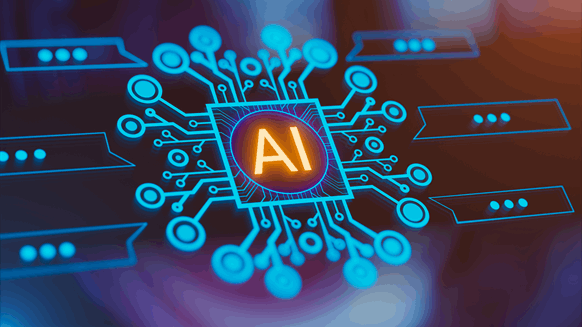Tech
SLB, NVIDIA Developing Gen AI Solutions for Energy

In a release posted on its website on Thursday, SLB announced that it is building on its long-standing collaboration with NVIDIA to develop generative AI solutions for the energy industry.
“The collaboration accelerates the development and deployment of industry-specific generative AI foundation models across SLB’s global platforms, including its Delfi digital platform and Lumi data and AI platform, by leveraging NVIDIA NeMo, part of the NVIDIA AI Enterprise software platform, to develop custom generative AI that can be run in the data center, in any cloud or at the edge,” the release stated.
SLB’s site describes the Delfi digital platform as an “open, scalable, and secure, cloud-based software environment with 24/7 operational support”. It “brings you the world’s best apps, AI, data management, and physics-based science for oil and gas exploration, development, drilling, production, midstream – and energy transition solutions”, according to the site.
The Lumi data and AI platform is described on SLB’s site as “a game-changer for energy companies, offering a complete AI lifecycle solution integrated with powerful data management capabilities”.
NVIDIA’s website describes NVIDIA NeMo as an “end-to-end platform for developing custom generative AI – including large language models (LLMs), multimodal, vision, and speech AI -anywhere”.
In its release, SLB noted that, working together with NVIDIA, it will “build and optimize models to the specific needs and requirements of the data-intensive energy industry, including subsurface exploration, production operations and data management”.
“This will help unlock the full potential of generative AI for energy domain experts including researchers, scientists, and engineers – enabling them to interact with complex technical processes in new ways to drive higher value and lower carbon outcomes,” SLB added.
Olivier Le Peuch, SLB’s Chief Executive Officer, said in the release, “as we navigate the delicate balance between energy production and decarbonization, generative AI is emerging as a crucial catalyst for change”.
“Our collaboration with NVIDIA will accelerate the creation of tailored generative AI solutions, enabling our customers to optimize operations, enhance efficiency, and minimize their overall footprint,” he added.
Jensen Huang, the Founder and CEO of NVIDIA, stated in the release, “AI offers the energy industry an extraordinary tool for sustainably providing the resource that powers life across our planet”.
“Custom models created by SLB leveraging NVIDIA NeMo will provide the industry’s scientists and engineers unprecedented insight to speed their work in optimizing the energy supplies today and unlocking the clean energy innovations of tomorrow,” he added.
SLB highlighted in the release that its collaboration with NVIDIA first began in 2008 with “the innovative use of graphics processing units (GPUs) for subsurface imaging and geoscience interpretation”.
SLB added that the companies have worked closely over the years “to optimize every generation of SLB’s high-performance compute and visualization technologies available on its Delfi platform”.
Fundamental Transformation
A feature posted on SLB’s website on Thursday, which focused on SLB and NVIDIA’s collaboration, stated that artificial intelligence “will fundamentally transform the way the energy industry works over the next 5 – 10 years”.
“One of the most exciting developments in our collaboration with NVIDIA is our joint work on generative AI solutions,” SLB VP of Digital Technology Shashi Menon said in the feature.
“By leveraging SLB’s vast data and knowledge base, we are developing large language models (LLMs) and industry-specific foundation models that can be integrated into our existing applications to provide intelligent assistance,” he added.
“These AI models have the potential to streamline workflows, improve efficiency and performance, and unlock new insights from data for our customers,” he continued.
“Our companies’ long-standing working relationship is a testament to the power of collaboration in driving innovation. By combining our collective expertise in energy technology, accelerated computing and AI, we are shaping the future of the energy industry and contributing to a more sustainable and efficient world for the benefit of all,” Menon went on to state.
SLB Launches Lumi
In a release posted on its website on Tuesday, SLB announced the launch of the Lumi data and AI platform.
The open, secure, and modular platform unlocks access to high-quality data across subsurface, surface, planning and operations, increasing cross-domain collaboration and releasing new intelligence and insights to improve the quality and speed of decision making at enterprise-level, SLB stated in that release.
The latest large language models as well as industry-optimized domain foundation models from SLB will be embedded in the platform, SLB noted in the release. The company said in the release that the Lumi platform is built on the latest industry standards and will be available on all major cloud service providers as well as on-premises. It added that the platform integrates technologies from leading technology partners with SLB’s digital and domain expertise to facilitate access to data and AI capabilities across the energy production cycle.
According to the release, SLB’s Delfi digital platform will be enhanced by leveraging the data foundations and machine learning capabilities of the Lumi platform. This will enable more powerful and agile reservoir modeling, seismic and wellbore interpretation, directional drilling and geosteering workflows, the release stated.
“AI is fundamentally altering the dynamics of our industry, but its transformational potential is hindered by the complexity of our industry’s data ecosystems,” Rakesh Jaggi, SLB President, Digital and Integration, said in the release.
“Through the Lumi data and AI platform, we will liberate and contextualize data for our global customers across domains – enabling them to scale advanced AI workflows and accelerate their ongoing digital transformation,” he added.
To contact the author, email andreas.exarheas@rigzone.com







